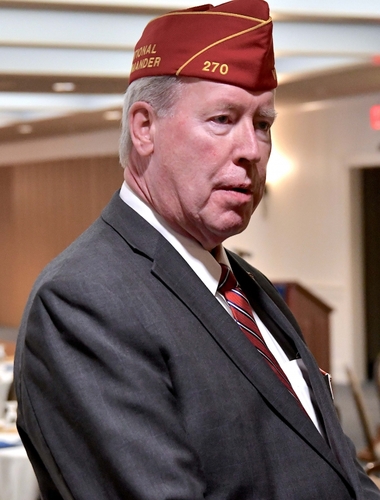BRATTLEBORO — The American Legion is celebrating its 100th anniversary this year, but the nation's largest veterans organization finds itself in the same position as many other service groups in the United States - struggling to maintain its relevance amid a changing society.
The Legion's national commander, Brett P. Reistad of Manassas, Va., addressed this issue during a visit to Brattleboro Post 5 on April 11.
While the Legion still has 2.7 million members and still possesses a fair amount of clout on Capitol Hill, Reistad said that the organization's membership has been steadily declining since the 1990s.
“Most of that is due to the passing of the World War II and Korean War veterans,” Reistad said. “They were the backbone of the organization for so many years.”
Now, much of the leadership of the organization is made up of Vietnam War–era veterans such as Reistad.
From 1974 to 1978, Reistad served in the Army with the Presidential Salute Battery of the 3rd United States Infantry Regiment (The Old Guard) at Fort Myer, Va. He participated in the inaugural ceremony for President Jimmy Carter in 1977, as well as in other high-profile ceremonies.
After his honorable discharge, he went into law enforcement and served 26 years with the Fairfax County Police Department, retiring at the rank of lieutenant.
He then started a second career as a law enforcement services coordinator for the Regional Organized Crime Information Center of the Regional Information Sharing Systems program, a law-enforcement investigative assistance program of the U.S. Department of Justice.
'It's always been cyclical'
Reistad, a member of the Legion since 1981, has served at every level of the organization before being elected national commander last year.
“I started out early in the Legion, at a time when a lot of Vietnam vets wanted nothing to do with the Legion,” he said, adding that when he joined, he was about the same age as today's veterans of the Iraq and Afghanistan wars.
“I don't think the younger vets are steering away from veterans groups,” said Reistad. “I think they have different priorities right now.”
But he said that generation gaps are nothing new for his organization.
“World War I veterans started the American Legion, and when the World War II and Korean War veterans started filling the posts, they had to prove themselves to the older members. The Vietnam guys were ostracized by the World War II guys at first, and now they comprise the majority of the organization. It's always been cyclical.”
Reistad said the current generation of veterans is looking for something different from veterans groups. Unlike veterans of past conflicts, who served in a time when being in the military was something that nearly every adult male experienced, today's veterans come from a society where the impact of nearly 18 years of war has mostly fallen upon a very small segment of the U.S. population.
Many of today's Iraq and Afghan war veterans are married with families, and Reistad said veterans organizations need to do more outreach to this age group.
He praised current Post 5 commander John Hagen and the work he has done to make the Brattleboro post a place for veterans of all ages and their families.
“The new generation of veterans are going to be the ones who sell others on joining,” Reistad said.
And other veterans organizations, such as Veterans of Foreign Wars, Vietnam Veterans of America, the Marine Corps League, and Disabled American Veterans, will have to think about pooling their resources.
“My message, as I travel around the country, is that VFW and Legion posts need to support each other,” said Reistad.
“In some towns, the veterans groups share one building and act as a center for all veterans,” he added. “In the end, it's about veterans serving veterans, and it doesn't matter which organization you belong to.”
While newer veterans groups, such as Iraq and Afghanistan Veterans of America, Student Veterans of America, Team RWB, and the Wounded Warrior Project, are attracting veterans in their 20s and 30s, Reistad said that the Legion and other older veterans organizations still matter.
“Having more than 2 million members still means something on Capitol Hill,” he said. “We are fighting for the interests of all veterans.”
